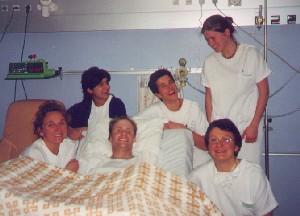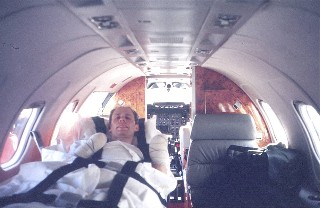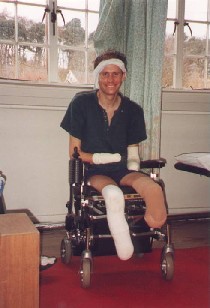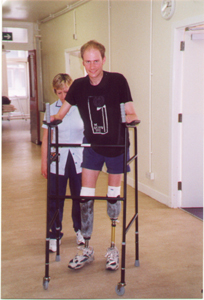| On the twenty-fourth of January nineteen ninety-nine, my climbing partner, Jamie Fisher, and I departed from Chamonix, France to make an attempt on the North face of the 4000m Alpine peak of Les Droites. Conditions as we set off were perfect. By the time we reached the top of our climb, two days later, a fierce storm had blown in so we dug in for the night. That storm continued for another five days. We were finally reached by a rescue helicopter, after many valiant attempts, on the thirty-first of January. By then I was hypothermic and severely frostbitten. Jamie was dead.It’s eight months now. More than half a year has passed since I was plucked, spinning below a helicopter, from my icy prison perch, twelve thousand feet up in the storm-bound French Alps. Whisked from the brink of death my half frozen body was rushed from the giddy mountain heights, down into the waiting hands of the doctors and nurses of l’Hopital Chamonix. As I came round to the clamour of urgent French voices, my precious clothes being wrenched and cut from me, the smell of antiseptic, and the glorious warmth of heated blankets and hot water, I already knew that this was a very different world from the place I had left behind six days before.
I didn’t at that moment have much of an idea of what future lay ahead of me but even to my hypothermia muddled mind some things were clear. Jamie, my companion, was dead. His ice bound body, face down in the snow had been the last thing I saw as the winch line came tight on my harness and jerked me bodily into space. No miracle rescue could bring him back. And my own body, I knew, could never be the same again. My hands and feet, all four of them, were frozen solid, like blocks of ice. I didn’t know a great deal about frostbite and its treatment, but I did know that this was serious and there was no way I was going to get away scot-free from this one. The expressions on the doctors’ faces confirmed this. How do you cope with something like this? How do you come to accept the realisation that your life has suddenly been totally and inextricably, completely and utterly turned on its head and torn apart almost beyond recognition? I didn’t see this coming. I had no idea this was going to happen. I’ve been climbing for more than a decade now, both in leisure and in my work as an industrial rope access technician. In all that time I’ve never suffered more than a few minor muscular strains. That’s not to say that I wasn’t aware of the risks. In fact understanding and undertaking risk is, for many climbers, an integral part of what their chosen sport is all about. Finding one’s limits, mental and physical, and exploring them, is for many people, like myself, a way of making some sense out of life, adding definition and reality. But I still didn’t see this coming. This kind of thing doesn’t happen to me. Well the next few days in Chamonix Hospital were pretty tumultuous. Amid the confusion of tearful family and friends, each one striving to make sense of it all, excitable gallic medical staff, arguing around my bed, and of course the persistant and often obnoxious intrusion of the press, I began to try to get my head round the situation. Immobile in my hospital bed my mind was free to wander at will, or often against it, around the mountains of uncertainty rising up about me. This was a time of extreme and varied emotion, unpredictable and constantly changing: Pure joy at having survived, being alive, being with the ones I love, having lost all hope of ever seeing them again. Total grief for the loss of Jamie, my best friend and long-time partner in adventure. Utter terror of the unknown and a decidedly uncertain future. Worry, doubt and frustration all preyed on my mind while bouts of extreme happiness and a renewed love of the world and everything in it filled the spaces between the troughs. And a desperate sense of guilt at having survived to be able to feel happy, plagued my tortured mind. How could it be right to let myself feel happy ever again when Jamie was dead? We’d been in it together, to the hilt, through thick and thin. Together we’d battled our way to the top of that mountain. Together we’d weathered the terrible storm which had pinned us to the spot for so many horrible days and nights. Our jubilance at the first sound of a rescue helicopter and our despair at its thwarted attempts to reach us were shared. And now here I was alive without him, and actually feeling happy. That can’t be right. With this sense of insecurity fuelling my darker emotions, my sense of guilt began to grow. To have put everyone through this with my own selfish acts was unforgivable. All the worry, the upset, the tears that everyone else was going through was all my fault. My girlfriend, my family, my friends, Jamie’s family and friends, people I had never even met, would all have their lives changed forever as well. I would be a burden on them and society forever. I suppose a natural reaction to these kind of mental difficulties is to bottle it all up, try to process it all internally. I’m not the kind of person who naturally gives away his feelings easily but fortunately I recognised at an early stage that this was too big for me to handle on my own. Nevertheless I found it difficult to express all the emotion which was going on inside me, and to most of my visitors I found it easier to present an air of cheerful optimism. It was only during the few hours of quiet I had with my girlfriend Anna at the end of each day that I really felt able to share my emotions, as did she. But the monsters of guilt and depression were still growing, fed I think my the insecurity of my medical position as the doctors battled to save my hands and feet. Soon I was unable to sleep properly, my health began to worsen, and my waking moments were tormented by severe back pain. A few things, however, tipped the balance in the other direction. Firstly, the battle for my hands and feet was lost. All four had to be amputated completely to save me from secondary infections. Surprisingly, this highly traumatic event had a net positive effect on me. Gazing down at my four bandaged stumps, unfamiliarly truncated and odd looking appendages, I knew now that this was what I had to deal with. This was the point from which I was to begin the next episode of my life. This was, in effect, my lowest point and everything from now on would be better. And so it was. With a new, more confident outlook on my existence, without hands and feet, I was soon chatting with my bedside visitors about all the things I could do, all the things I might achieve in the days and months and years to come. Of course with little or no conception of what could be achieved or what had been achieved by people in my position, if indeed there even were other people in my position, early speculations about my future were just that – speculations supported by various oddments of anecdotal evidence. However, people’s tales of friends of friends who had legs, arms or various other sundry items amputated, no matter how irrelevant, always served to spur me on and my mood improved daily.
The third factor which really helped convince me that my life was still worth living was the incredible response I got from other people. Friends and family traveled from around Europe to be at my side. A trickle of correspondence from well-wishers soon welled into a flood of cards, letters and faxes and the walls of my hospital room became plastered with pictures and messages of sympathy from both friends and strangers. In the light of all this positive feeling I couldn’t help but look on the bright side of things. Soon, as I grew stronger, it was time to leave Chamonix to continue my recovery back home in Scotland. But those first few weeks in hospital, in France, I think defined for me the mental position with which the rest of my recovery was carried out and I am truly thankful that I was able to avoid those early pitfalls and depart for Edinburgh ready to meet my new future.
What a fuss is being made over me. What expense and effort is being gone to. This repatriation alone must be costing thousands of pounds. And everyone I meet, from whatever country, says how closely they have followed my story, and how brave they think I am and how well I’m doing. Well I don’t think so. I’m just being me. But if I’m going to be worth all this fuss, if I’m going to be able to live up to it all, I’m going to have to put every little bit of effort I’ve got into being me. What the future holds for me I have no idea. Whether I’ll ever walk again, live in my own home, go to work, enjoy the open air, or anything, I just don’t know. Not a clue. We’re only flying to Edinburgh but this feels like a big journey. But it’s a journey I’m making with the one I love the most and it will take me home to where everyone else I know and love is waiting for me expectantly, so I will try and leave my doubts behind me. Touch down at Edinburgh Airport on a dank February morning and the expected ambulance was nowhere to be seen. “Usually the ambulance waits for us.” said our pilot, genuinely mystified. Eventually a clapped out old patient transfer wagon rolled up and carted us all off round the by-pass towards the Princess Margaret Rose Hospital. As we drew up alongside the hospital’s rather dingy entrance, paint peeling from the walls, my medical escorts looked horrified. “This is not a hospital, this is a farm!” the doctor protested. Fortunately the PMR belies its outward appearance and is actually a centre of excellence in the fields of orthopaedics and prosthetics. I was initially inconsolable at the thought of spending the indefinite future languishing in hospital but soon things didn’t seem quite so bad. As I recovered from a final operation to my stumps, an army of occupational therapists, physiotherapists, prosthetists, dietitians and social workers marched in and began to get my rehabilitation off the ground. At this point I could do nothing for myself. Absolutely nothing. I couldn’t sit up in bed, go to the toilet, or even hold a book. And most humiliating of all, for me, was being spoon-fed my every mouthful of food. But soon the physios had me shuffling off my bed into a wheelchair and an occupational therapist had a spoon strapped to one of my stumps so that I could feed myself soup, an achievement which almost brought tears to my eyes. Everyday I amazed myself and those around me with fresh achievements. Learning to manipulate with my stumps was slow and frustrating, especially in their clumsy bandaged state, but soon I was reading books and newspapers, operating the television remote control, brushing my teeth and writing my name with a pen strapped to my stump.
Often people just wouldn’t know how to react and instead would turn to Anna and ask if I needed any help. So I decided that there probably wasn’t any point trying to take account of other people’s reactions and prejudices, and that the best thing I could do was to just get on with it and try not to be embarrassed in public. Which is sometimes a difficult thing to do. Anna and I paid a visit to the new Dean Gallery soon after it was open. Unfortunately the wheelchair entrance hadn’t yet been completed, and we were presented with a flight of twenty odd steps to get in. I was determined not to be defeated so to the shock of the extremely apologetic reception staff, I slid out of my chair and crawled up the steps on all fours. The months crept by. By April my bandages were coming off, one by one, and my first prosthetic legs were being cast. My early walking training caused much amusement. With the first prototype leg bound uncomfortably to my right stump, my left leg was encased in something called an early walking aid. Basically this consists of a huge inflatable sock which engulfs the entire leg. This in turn is encased in a large steel frame with a foot-like rocker at the bottom. The whole thing looks like some horrible mediaeval torture implement but is in fact a sort of one-size-fits-all practice leg. So with this monstrosity and my other more slimline leg, I would hobble out of the ward, pushing a giant zimmer frame in front of me, and frightening little children. Soon however I was the very proud owner of two prosthetic legs and was taking my first, wobbly, unaided steps. This was a good feeling.
I won’t go into the details of my entire recovery as it is a long story and one which is very much on-going. But eventually I was able to walk out of hospital and up the stairs to my own flat. This off course created a whole new set of difficulties and challenges. And I went back to work in the office of my old rope access company, Web Access Engineering. I have been doing some modest walking, been sailing a couple of times, and generally been leading a nice life. I almost feel like a normal human being again. Almost. I still need regular assistance with day to day care. Children still stare at me which somehow hits me harder than the comments of ignorant adults. And occasionally still, I shock myself, as I wake from reverie to catch site of my mutilated limbs and think, “Christ! This is me! I’m handicapped”. But being handicapped isn’t so bad: Driving, skiing, hillwalking, cooking, rock-climbing, running, cycling. These aren’t things I can do. These are a few of the challenges I intend to turn my mind to. These are things I could do. And if there’s one thing I’ve learnt over the last eight months, it’s that every problem has a solution. Anything is possible. |
 And as my mood bettered, so the excruciating pain in my back started to fade. This was the second factor which helped me out of my mental difficulties. The miraculous disappearance of all pain in my back as soon as I began to cheer up a bit really brought home to me the power of the human mind and the inextricable, unexplainable link between it and the human body. Mind over matter. My mind is the important thing. And I realised then that that was the whole point. I was still alive and that was all that really mattered, no matter what state my body was in I was still here, living and breathing and experiencing the miracle of life. And there was no way I’d battled through the grim hell of survival on that mountaintop only to come down and be miserable. So I made up my mind to be happy.
And as my mood bettered, so the excruciating pain in my back started to fade. This was the second factor which helped me out of my mental difficulties. The miraculous disappearance of all pain in my back as soon as I began to cheer up a bit really brought home to me the power of the human mind and the inextricable, unexplainable link between it and the human body. Mind over matter. My mind is the important thing. And I realised then that that was the whole point. I was still alive and that was all that really mattered, no matter what state my body was in I was still here, living and breathing and experiencing the miracle of life. And there was no way I’d battled through the grim hell of survival on that mountaintop only to come down and be miserable. So I made up my mind to be happy. So that’s my position as I lie strapped to a stretcher in a frighteningly small, fast and expensive Leer jet, it’s two German pilots immaculate in their smart uniforms. A female doctor and a paramedic, also German, dressed rather scarily in all white casuals, fuss over me with Teutonic efficiency. And Anna, as always at my side, looks pale and overwhelmed by it all.
So that’s my position as I lie strapped to a stretcher in a frighteningly small, fast and expensive Leer jet, it’s two German pilots immaculate in their smart uniforms. A female doctor and a paramedic, also German, dressed rather scarily in all white casuals, fuss over me with Teutonic efficiency. And Anna, as always at my side, looks pale and overwhelmed by it all. As my health recovered, I was able to make trips out of the hospital. Anna and friends would wheel me round museums and teashops and to the cinema. It was at this stage that I really started having to deal with the reactions of the general public to me. Its strange to think that whereas before if someone encountered me in the street they wouldn’t think twice about me, now I’m likely to be the oddest looking person they’ve met all week. I noticed people staring at me. Small children just couldn’t take their eyes off me.
As my health recovered, I was able to make trips out of the hospital. Anna and friends would wheel me round museums and teashops and to the cinema. It was at this stage that I really started having to deal with the reactions of the general public to me. Its strange to think that whereas before if someone encountered me in the street they wouldn’t think twice about me, now I’m likely to be the oddest looking person they’ve met all week. I noticed people staring at me. Small children just couldn’t take their eyes off me. For the upper limbs too, advances were being made. There isn’t as yet a miracle bionic arm, despite frequent exaggerations in the press, which can do the job of the human hand. I was instead fitted with the most popular choice for the upper arm amputee, which is a mechanically operated split hook. A bit barbaric in appearance but nevertheless practical and versatile. The original Velcro straps, for me however, have been the most successful upper limb prosethes. I use them to hold cutlery, pens (with which, I am teased, my handwriting has actually improved), and indeed the one-finger typers with which I am typing these words.
For the upper limbs too, advances were being made. There isn’t as yet a miracle bionic arm, despite frequent exaggerations in the press, which can do the job of the human hand. I was instead fitted with the most popular choice for the upper arm amputee, which is a mechanically operated split hook. A bit barbaric in appearance but nevertheless practical and versatile. The original Velcro straps, for me however, have been the most successful upper limb prosethes. I use them to hold cutlery, pens (with which, I am teased, my handwriting has actually improved), and indeed the one-finger typers with which I am typing these words.